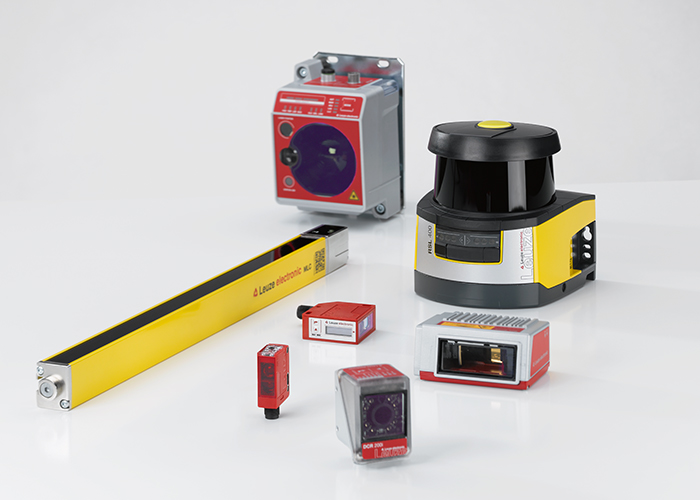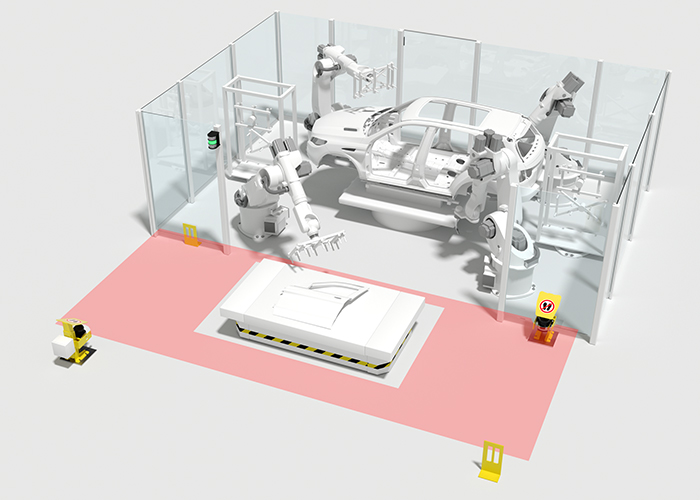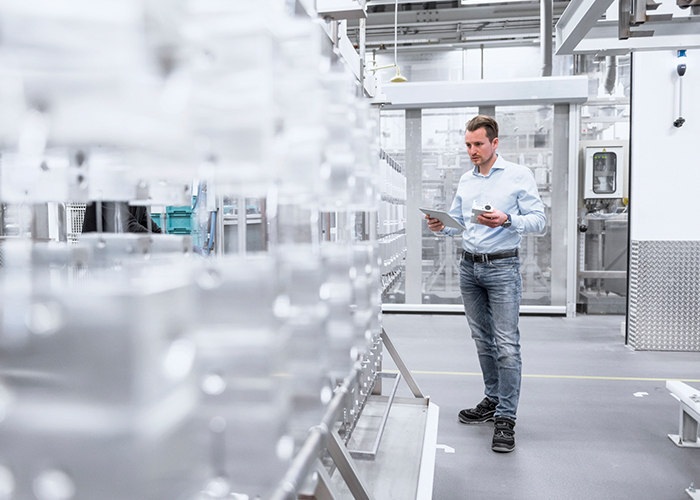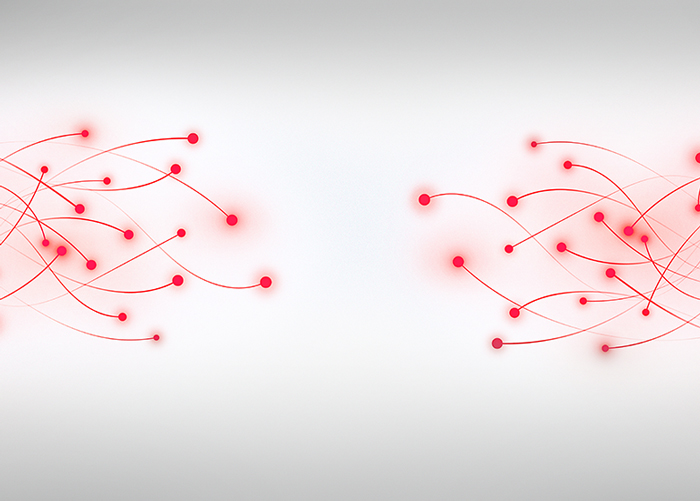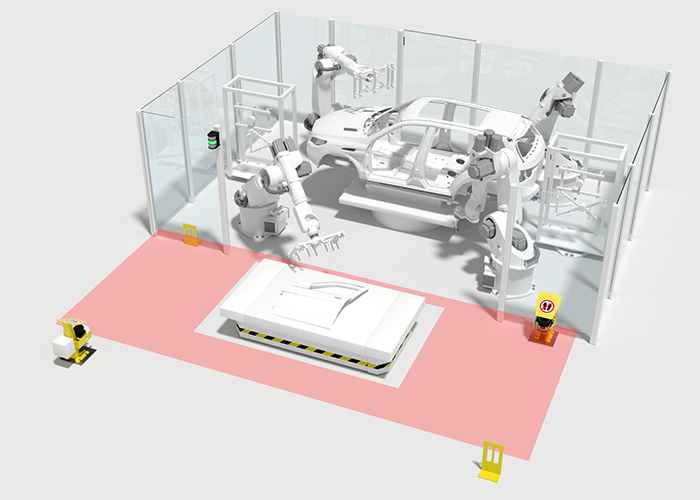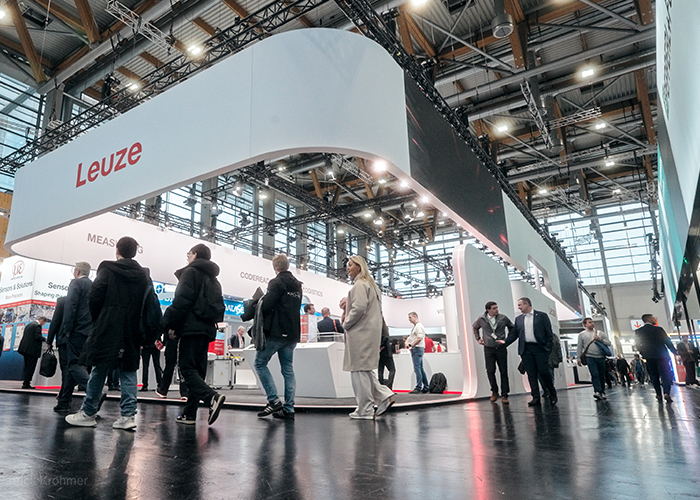
Sensor solutions for laboratory automation
There are three things that are expected of sensor solutions in laboratory automation: reliability, safety and user-friendliness.
It is not without reason that the safety requirements for in-vitro diagnostics are especially high: this lab work involves human samples. Extremely strict specifications apply here and there is no tolerance for error. This also places high demands on the used camera-based 1D- and 2D-code readers of the DCR 50 and DCR 200i series, for example. With their sophisticated design and special optics they combine the factors of speed, reliability, safety and a user-friendliness that helps to pre-emptively minimize the risk of errors.

Reliable change management
For your safety, we will make no unannounced changes to either hardware or software. Our customer-specific model numbers make this possible.

Many years of application experience
We have many years of application experience in laboratory automation, making us the professional and reliable sensor supplier for the demanding tasks in medical technology.

Intercontinental networking
Our experts for laboratory automation are represented as a team in 6 countries (CH / CN / D / USA / FR / IT) and, as a result, can directly address the local needs of our customers.
Areas of application and product highlights
Sensor solutions for pre-analytic instruments

To ensure the sample integrity as well as for hygiene and safety reasons, automatic sample distributors are used increasingly in the preparation of the analyses. These ensure reliable and fast preparation and assignment of the chaotically delivered samples independent of the number of samples and, above all, avoid cross contamination. Thanks to high function reserves, our sensor solutions guarantee maximum system availability during analysis preparation. High-performance bar code readers, for example, are used to identify the information on the sample tubes and prepare it for the automatic analyzers. Or, we use optical sensors within the machines to ensure that the seals were properly removed and that the samples are reliably prepared for the next steps.
Sensor solutions for IVD analyzers

Modern analysis procedures for examining body fluids or tissue are now highly automated, thereby allowing processes to be performed very efficiently and safely. Zero tolerance is essential here both during the handling as well as during the assignment of samples to the patient. The sensors that are used must, therefore, reliably master high throughputs and be extremely compact so as to minimize space requirements in the systems. Our bar code readers for tubes, for example, can have a reading field height of 80 mm to be able to reliably detect at just a short distance. Depending on where the automatic machine is used and the volume of sample that is to be analyzed, carousel, single- or multi-lane, or point-of-care solutions are used. Maximum reliability is the most important property of our sensor solutions for laboratory analysis. Our high-performance code readers for 1D- or 2D-codes DCR 50 and DCR 80 serve as, e.g., elementary function units for these automatic machines, as they must detect the samples with absolute certainty to allow the analysis results to be assigned error-free. Capacitive sensors are used in automatic analyzers as an early warning system to safeguard the processes and reliably report the unplanned release of sample liquids. Our CSL light curtain safeguards the interior of the analyzers, thereby preventing, e.g., tampering with samples.
- 1D-code identification / CR 50/CR 55 or CR 100
- Monitoring of doors and flaps / L 100 / MC 3x
- Fill level monitoring / DMU or LCS or LS 55 H2O
- Stack-height monitoring / ODSL 9
- Presence control / Series 2 / Series 3
- 1D-code identification of up to 15 rack rows / BCL 148
- 1D-code identification of up to 6 rack rows / BCL 300i
- Safeguarding the process / CSL 505
- Leak monitoring / LCS
- Container fill level monitoring / K-L-50ML-20 / LV 463 or RKU 420
- 1D- and 2D-identification / DCR 80/DCR 85
- 1D- and 2D-code identification / DCR 40
Sensor solutions for automation modules

For complex analyses, samples need to be transported between various machines. This networking of the analyzers is increasingly being performed with compact, mini conveying belts and handling robots. The individual parts must be moved quickly, safely and reliably here and, prior to the subsequent analysis steps, also be detected and assigned without error. Furthermore, gapless traceability of the sampling path must be ensured. Sensors make sample transport more reliable and minimize the risk of standstills in the analyzers which could, among other things, jeopardize the sample integrity. Our compact, camera-based DCR 200i code reader enables, e.g., the fast detection of 1D- or 2D-codes even while in motion, guaranteeing fast sample transport. Along the transport route, safety proximity sensors such as the MC 300 or RD 800 monitor the closing state of the protection hoods and highly visible tower lights indicate the process state.
Sensor solutions for post-analytic instruments

Particularly when storing samples, dependable closure is extremely important for eliminating the possibility of subsequent contamination. In some cases, the storage is performed in deep-freeze conditions at temperatures at – 80°C, at which the sensor technology must continue to detect reliably. In addition, sensors ensure the traceability of the samples all the way to their storage location. Even after the actual analysis, sensors continue to make the processes faster and more reliable. Sensors with high resolution, flexible fiber optics are used to check, e.g., the proper affixing of sealing films, ensuring that processes are completed professionally. During sample storage, sensors such as the 2 series monitor for presence, even at extremely low temperatures.
Leuze pursues a consistent focusing and differentiation policy. This means: we are focused on those industries in which we have acquired in-depth application know-how and many years of experience. When our technological competences are applied to the relevant industry segments in a targeted fashion, this results in specific applications, in which we Sensor People are particularly strong. We put our experience to work for our customers on a daily basis to find the best-possible solution for them.

One of our focus industries is laboratory automation, in which Leuze supplies sensors for IVD analysis (in vitro diagnostics). These devices currently have a very important task in the fight against the spread of coronavirus. For our customers – especially in this industrial environment – we have for years been a reliable partner and forerunner as a specialist in laboratory automation and in vitro diagnostics. Together with our customers, we develop technological milestones and create the innovations of tomorrow. Which help to make our customers successful in the long term in a constantly evolving industry. After all, your success is our motivation. We stand together when it comes to making an active contribution to the fight against the spread of the coronavirus.
As a high-tech company and innovation driver in the field of automation technology, we Sensor People supply our customers in laboratory automation with solutions whose job is to scan in bar codes, correctly identify them and reliably pass on the content of the bar code to the analysis device so that the samples can be precisely assigned. This allows us, e.g., to obtain reliable information as to who tested negative or who tested positive and must be placed in quarantine to protect their environment, but also, in particular, to protect risk groups and to slow the spread of the coronavirus. When it comes to the reliable identification of samples in laboratories, zero-error tolerance is essential. All installed code readers need to detect and pass on the relevant codes with absolute reliability, regardless of the technology that is used. Moreover, we guarantee the deliverability of our products for the entire life expectancy of the used laboratory instrument. Even during times of difficult logistic processes, all of our customers received their deliveries on time. Together with you, we are focused on making our contribution in this time.

